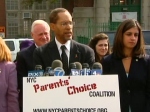This past week, Greg Pfundstein and I were in demand after a series of stories in the NY Post exposing the inappropriate and salacious content of City’s sex education curriculum. CNN invited me to discuss the goals of NYC Parents’ Choice on-air with CNN Newsroom anchor, Brooke Baldwin (10/26).
Ms. Baldwin prefaced the interview by explaining that the part of the curriculum includes content from the Columbia University Web site, “Go Ask Alice,” such as where to find pornography, how to have a ménage a trois, descriptions of fetishes and other things that made her blush.
I presented the coalition’s goal of giving parents the choice of an abstinence-centered curriculum that focuses on abstinence. Letting parents choose a curriculum that discusses the facts behind contraception and condoms, but does not present them as an equal alternative to abstinence. I pointed out that the city’s sex ed program places abstinence on the same level as using protection.
If you support the goals of NYC Parents Choice, contact Mayor Bloomberg and Chancellor Walcott. And sign our petition today.
The complete transcription of the interview follows below.
CNN NEWSROOM
Anger at NYC’s New Sex Ed Class;
Aired October 26, 2011 – 14:00 ET
 BALDWIN: …Let’s talk New York — the battle over what and when to teach kids about sex is playing out in New York. Many parents of 11 and 12 year olds are fighting the city’s first mandated sex ed curriculum in nearly 20 years.
BALDWIN: …Let’s talk New York — the battle over what and when to teach kids about sex is playing out in New York. Many parents of 11 and 12 year olds are fighting the city’s first mandated sex ed curriculum in nearly 20 years.
Here’s why part of this curriculum, the materials include content from this Columbia University Web site, “Go Ask Alice,” this is what it’s called. Some other topics if you take a peek of this Web site, you know, it includes where to find pornography, how to have a ménage a trois, description of fetishes and other things that might make you and me blush.
So, the “Go Ask Alice” site is based on the controversial book from the ’70s of the same name. And the book tells a story of a trouble teenage girl and it tackles some topics the New York parents complained are just too graphic for middle school kids.
Keep in mind, this Web site itself is not mandated, but all sixth and seventh graders will be required to take these new sex ed classes.
I want to bring in Michael Benjamin. He is the spokesman for the group that’s battling sex ed plan. He joins me from New York.
Michael, thanks for coming on.
MICHAEL BENJAMIN, NYC’S PARENTS CHOICE COALITION: Thank you, Brooke.
BALDWIN: Your group says that the curriculum that will be presented is just too graphic for, you know, 11 and 12-year-olds. What is it specifically that you and these parents object to?
BENJAMIN: Well, we object to the graphic nature of the “Go Ask Alice” site.
We would like to have one that’s abstinence-centered as opposed to one that’s basically about condoms and contraception, and giving a wink and a nod at teenage sex. We think young people should abstain from sex, [their] parents believe that and they themselves believe it. And all we were only asking the city of New York to offer a curriculum for parents opt into that would more reflect their values and their interests. And that would be abstinence-centered sex education.
BALDWIN: Let me pick up on the abstinence issue because I do know that this curriculum will be teaching abstinence and I do want to read a statement that CNN obtained from New York’s department of education. So — and I’m quoting, “Abstinence is the only way to be 100 percent safe but one-third of the new cases of Chlamydia in New York City are in teenagers and a significant part of our teenagers have had multiple sexual partners, so we cannot stick our heads in the sand about this.”
So, I mentioned, the course is teaching abstinence but it sounds like they also have a reality check as well.
BENJAMIN: Yes. But that’s not emphasized. The emphasis is on really on mitigating risks. It really isn’t about risk avoidance, which would be the focus of an abstinence centered sex education program for our young people. And it’s something that kids are interested in and that parents want.
You know, this week is “Partnering with Parents” week in New York City with the Department of Education. But somehow they don’t want to give parents the ability to choose which curriculum they want. Do they want a free sex for all curriculum or do they prefer an abstinence- centered one that reflects their values, and things they’re teaching their children at home.
This isn’t 20 years ago. We’re not fighting over whether to have sex education in our schools. What we’re saying is what you’re offering is too explicit, it’s too soon for 10 and 11-year-olds. We need to have it focused on abstinence, which is what parents want and children themselves have talked about. We want to have the same consistent message from home also coming out of the schools.
BALDWIN: Michael, I have read article upon article and article, and the views reflected from your group, I know these parents are very, very upset, but the Web site that I just mentioned, this “Go Ask Alice” Web site, affiliated with Columbia University, but New York’s board of ed says none of their books for this upcoming sex ed class will direct kids to that particular Web site.
So why has this Web site become such an issue among these parents that you represent?
BENJAMIN: Because the city’s (INAUDIBLE) [the DoE] is being disingenuous. It’s part of the curriculum that they’ve ordered. It’s part of the set of books. They’ve actually bought it.
And now they are saying that it’s up to the principal or the instructor of the program to use whatever they would like to use, which is even more troubling. We think, offer parents the opportunity, the option themselves, to choose the option or to choose an alternative sex education program that focuses on abstinence- centered education. And that’s what we’re asking for.
And those parents who want much more liberal, they can choose to stay in the city’s program. But offer an ability to have more reflective of their values.
BALDWIN: From what I understand, and you are correct, this sex ed course is mandated for these students. But there is a process, there is a way if parents do want to opt out, they can. Though I understand some of these parents are frustrated that the process is too complicated. Is that correct?
BENJAMIN: That’s correct. It’s complicated. It has to be based on your religion. You have to get the [consent] form from your principal.
You know, it’s not about opting out of anything. It’s only opt-out of city. It’s not out of the explicit lessons.
But in reality, no one should opt out. They should be able to opt into a program that allows their children to get accurate information about healthy sex education, to understand that abstinence is 100 percent effective. Condoms are not 100 percent effective. You can still be exposed to sexually transmitted diseases.
You know, we have a mayor who tells everyone they can’t smoke, we can’t have trans fats in our restaurants. He wanted the poor not to be able to purchase soda, sweets with their food stamps, but yet he’s saying it’s OK for teenagers to have access to condoms in school. It’s OK for students to talk about it’s nowhere to go for contraception and where to go for abortion if necessary. That’s not —
BALDWIN: But, Michael, on the flipside, and forgive for interrupting, but I think from the perspective of the other side, you know, you have those who absolutely subscribe to kids wanting to be abstinent, but at the same time, you know, the New York Department of Education says that look, realistically speaking, we have to educate our kids on condom as well.
Do you not see that as well?
BENJAMIN: No. See? We agree as well. We’re saying it should be an abstinence-centered program that focuses on abstinence. That discusses contraception that discusses condoms, but does not present them as an equal alternative to abstinence. And the city’s program presents abstinence as being on the same level of using protection.
BALDWIN: OK.
BENJAMIN: And that’s where we have a lot of objection. And the city keeps obfuscating the issue. Our issue is not about whether or not to offer sex education. We want to provide sex education for our children for our children, from an abstinence perspective that their parents support and the children themselves. And survey after survey has said they want to hear the abstinence message so it’s reinforced in school from what they’re getting at home.
BALDWIN: Sure. And I do also just want to mention that we did invite Chancellor Walcott from the New York Department of Education to join us for this segment. They told us that he was not available today.
But, Michael Benjamin, we appreciate you being available. Thank you so much for coming on and explaining what some of these parents are frustrated about. Thank you.
BENJAMIN: Thank you.



